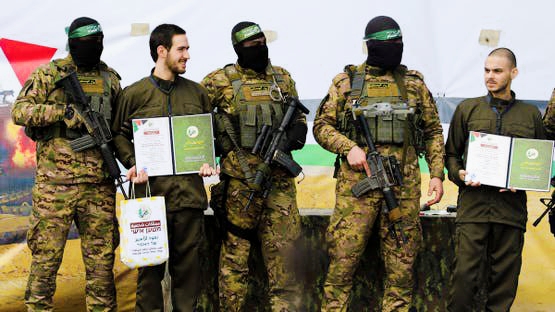On Friday, August 22, U.S. President Donald Trump ignited widespread controversy in Israel after revealing sensitive information regarding the number of living prisoners held by Hamas in the Gaza Strip, which caused discontent among political and military circles, as well as among the families of the prisoners.
In a press conference held at the White House, Trump stated that "the number of Israeli prisoners still alive with Hamas is likely to be less than 20 out of 50 prisoners held by the group," adding that "two other prisoners may have died" inside the strip.
Trump confirmed that he expected Hamas to start rejecting deals when the number of prisoners fell below 20, noting that the group is currently offering "only 10 prisoners for any potential agreement."
He also claimed credit for the release of the remaining prisoners, asserting that their families "do not oppose Israel's plan to completely invade the Gaza Strip."
Trump added in a striking statement: "This situation must end immediately; what is happening is extortion that must stop. The prisoners will be safer if Israel hastens to implement its plan for full control of the strip," claiming that Hamas fears that releasing the prisoners could mean "the end of their lives."
* Angry Israeli Responses to Trump's Statements
In a swift response, the former Coordinator for Prisoners and Missing Persons in the Israeli army, retired General Gal Hirsch, denied the accuracy of Trump's claims, confirming that "Israel has no information indicating the death of more prisoners in Gaza."
Hirsch clarified that official data indicates there are 20 prisoners alive, pointing out that "the condition of two of them is extremely critical," while 28 others have died according to estimates.
For its part, the "Forum of Families of Israeli Prisoners" issued a statement strongly criticizing Trump's remarks, accusing some Israeli officials of failing to communicate with the families.
The statement read: "If Strategic Affairs Minister Ron Dermer knows something different about the fate of the prisoners, he should inform the families first before any public statements."
The forum added: "Each of the fifty prisoners represents an entire world, and our sacred duty is to bring them all back without exception."
* New Movements in the Exchange Deal File
Amid this controversy, Israeli media sources revealed new movements to resume negotiations for the exchange of prisoners between Israel and Palestinian factions.
Channel 12 reported that unnamed informed sources stated that international mediators have contacted both sides to coordinate the date and location of the next round of talks, with estimates that it will take place in a few days.
The channel added that the Israeli delegation that participated in previous talks in the Qatari capital, Doha, will lead the next round, with expectations of holding it in a new location that has not yet been disclosed.
These developments come amid increasing public pressure within Israel, where families of the prisoners are demanding the government expedite reaching an agreement that guarantees the release of their loved ones.
It seems that this pressure is starting to bear fruit, as Prime Minister Benjamin Netanyahu issued instructions on Thursday to begin immediate negotiations to secure the release of the prisoners, alongside ongoing planning for a comprehensive military operation in the Gaza Strip.
Trump's surprising statements and their implications come at a critical moment of ongoing escalation between Israel and Hamas, placing further pressure on the Israeli government to respond cautiously and achieve tangible progress in the complex prisoner file.

